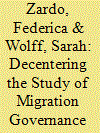| Srl | Item |
| 1 |
ID:
189110


|
|
|
|
|
| Summary/Abstract |
This paper argues in favour of a radical de-centring of our understanding of international migration governance that privileges the viewpoints of origin and transit countries, non-state actors and includes both urban and rural perspectives. Building on the contributions to this Special Issue, I propose a plural understanding of governance and elaborate on the different dimensions along which we can de-centre our understanding of the governance of international migration (and of the related political and policy discourses). The paper starts by discussing the 21st century context within which migration governance is inscribed and proposes a working definition of de-centring and pluralizing our understanding of migration governance. I then introduce the multiple ways in which we can think of this de-centring: along a geopolitical approach that gives primacy to the role that countries play in migration processes; along a spatial approach (views from the city vs views from rural areas); or with reference to the actors involved (state, civil society, private sector, migrants and their households). The paper concludes by discussing the importance of such radical de-centring for our thinking and speaking about migration.
|
|
|
|
|
|
|
|
|
|
|
|
|
|
|
|
| 2 |
ID:
189104


|
|
|
|
|
| Summary/Abstract |
To what extent can a decentred approach improve our understanding of migration governance? In the field of public policy, it ‘highlights the diverse and contingent meanings that inform the actions of the individuals involved in all kinds of practices of rule’ (Bevir Citation2016, 232). In this special issue we engage indeed not only with decentring the institutions and actors involved, but also the meanings produced, narratives constructed as well as the practices they entail. Applied to the context of international relations and political geography, decentring pays attention to actors´ perceptions and practices that shape the negotiation process (El Qadim Citation2018; İşleyen Citation2018b). It also normatively engages with deconstructing dominant assumptions in the study of world politics (Bilgin Citation2017). In their call for a paradigm shift in the study of the European Union (EU)’s international relations, Fisher Onar and Nicolaïdis argue that decentring involves, first, unpacking “the social scientific categories, assumptions and paradigm that underpin Eurocentric truth claims” and then “engaging with the assumptions and worldviews that underpin others’ accounts” (Onar and Nicolaïdis Citation2013, 286).
|
|
|
|
|
|
|
|
|
|
|
|
|
|
|
|